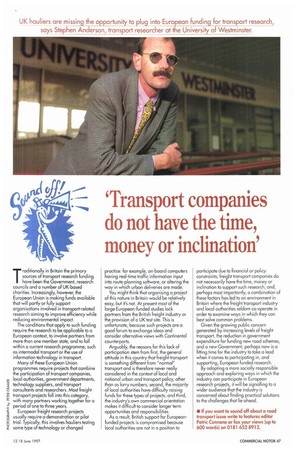'Transport companies do not have the time, money or inclination'
Page 63

If you've noticed an error in this article please click here to report it so we can fix it.
raditionally in Britain the primary sources of transport research funding
T
have been the Government, research councils and a number of UK-based chaHties. Increasingly, however, the European Union is making funds available that will partly or fully support organisations involved in transport-related research aiming to improve efficiency while reducing environmental impact The conditions that apply to such Funding require the research to be applicable to a European context, to involve partners from more than one member state, and to fall within a current research programme, such as intermodal transport or the use of information technology in transport. Many of these European Union programmes require projects that combine the participation of transport companies, local authorities, government departments, technology suppliers, and transport consultants and researchers. Most freight transport projects fall into this category, with many partners working together For a period of one to three years. European freight research projects usually require a demonstration or pilot trial. Typically, this involves hauliers testing some type of technology or changed practice: for example, on-board computers Having real-time traffic information input into route-planning software, or altering the way in which urban deliveries are made.
You might think that organising a project of this nature in Britain would be relatively easy, but its not. At present most of the large European-Funded studies lack partners From the British freight industry or the provision of a UK test site. This is unfortunate, because such projects are a good forum to exchange ideas and consider alternative views with Continental counterparts.
Arguably, the reasons for this lack of participation stem from first, the general attitude in this country that freight transport is something different from "normal" transport and is therefore never really considered in the context of local and notional urban and transport policy, other than as lorry numbers; second, the majority of local authorities have difficulty raising funds for these types of projects; and third, the Industry's own commercial orientation makes it difficult to consider longer term opportunities and responsibilities. As a result, British support For Europeanfunded projects is compromised because local authorities are not in a position to participate due to financial or policy constraints; freight transport companies do not necessarily have the time, money or inclination to support such research; and, perhaps most importantly, a combination of these Factors has led to an environment in Britain where the freight transport industry and local authorities seldom co-operate in order to examine ways in which they can best solve common problems. Given the growing public concern generated by increasing levels of freight transport, the reduction in government expenditure for funding new road schemes, and a new Government, perhaps now is a fitting time for the industry to take a lead when it comes to participating in, and supporting, European funded research. By adopting a more socially responsible approach and exploring ways in which the industry can participate in European research projects, it will be signalling to a wider audience that the industry is concerned about finding practical solutions to the challenges that lie ahead.
• If you want to sound off about a road transport issue write to features editor Patric Cunnane or fax your views (up to 600 words) on 0181 652 8912.
























































































































